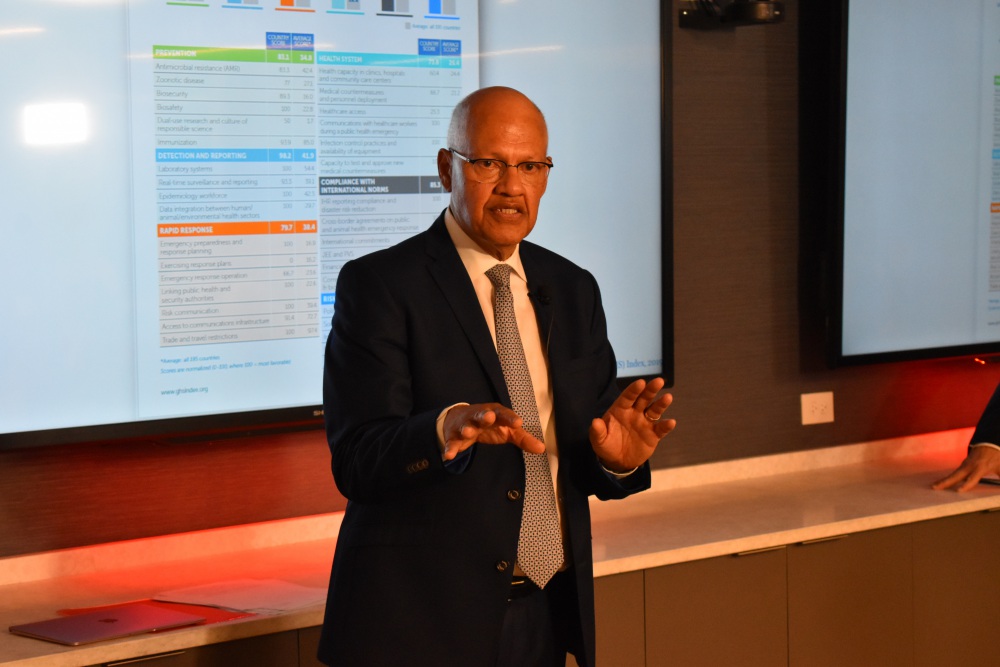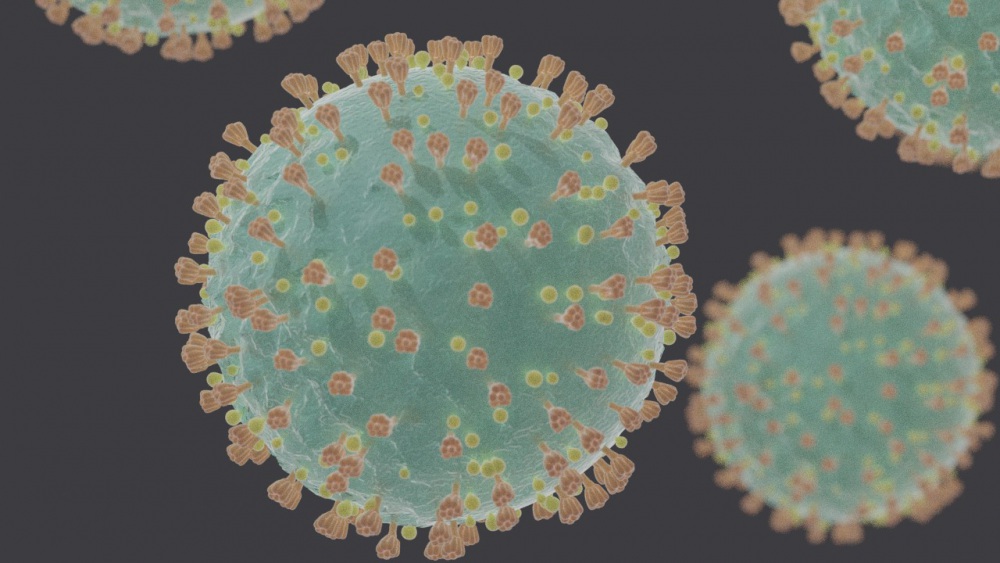
Jacob H. Eckles
Senior Program Officer, Global Biological Policy and Programs
Atomic Pulse
Wilmot James, a
visiting professor of political science and pediatrics at Columbia University, discussed challenges associated with
preventing, detecting, and responding to infectious disease outbreaks in challenging
circumstances at a January 15, 2020 NTI Seminar titled, “Battling Insecurity, Mistrust and Disease:
Are We Capable of Reining in Epidemics in Complex Environments?” A senior consultant to NTI | bio,
James was previously a Member of Parliament in South Africa, serving as
opposition spokesperson on schools, trade and health.
Professor James focused on three circumstances that pose
particular challenges for responders, governments and international
organizations trying to stop the spread of infectious diseases: when outbreaks
occur where government instability and conflict are prevalent such as in areas
of war where weak health infrastructure undermines local and international
response capability; in weak states with poor health leadership where communities
are left to handle outbreaks on their own; and when emerging threats from
climate change and biotechnology require critical attention from authorities unprepared to manage their impact.
War and Epidemics
Fighting epidemics in countries and regions plagued by
violence and instability poses perhaps the most substantial challenge, James
said. He cited recent data from the Global Health Security (GHS) Index, a
project of NTI and the Johns Hopkins Center for Health Security, in partnership
with The Economist Intelligence Unit, which shows more
than half of countries face major political and security risks that could
undermine national capability to counter biological threats.
James noted that war disrupts the delivery of health
services by public and private entities and creates circumstances where
pathogens can exploit gaps in health infrastructure. In addition, over time basic
health gains stall, populations become less healthy overall, and vaccination
rates drop. For example, the current Ebola outbreak in the Democratic Republic
of Congo has led to an explosion of measles cases in the region—310,000 measles
cases have been reported and 6,000 people have died since the start of 2019.
James argued that a new approach to security in Africa is
needed to stem outbreaks and deliver health services more reliably. While the
World Health Organization (WHO) can deliver some operational and logistical
support in crisis areas, much more is needed. Making more tangible gains in
combating epidemics in complex environments will require the United Nations,
African Union, regional bodies, and relevant domestic actors to come together
to find an enduring political solution for health security.
Health Leadership in Weak States
James also highlighted the importance of country and
community public health leadership to combat epidemics and improve global
health security. Governments typically have the authority, reach, and budgets
that allow for intervention to stop public health threats, but when governments
fail to act – either by negligence or inability – communities and citizens are
left to work out problems for themselves. When this happens, James said, communities
plunge into panic, creating social breakdown and mistrust. This is particularly
problematic with respect to newly emerging biological threats or agents that spread
at a surprising rate with a larger-than-expected geographic range. For example,
health workers on the front lines of the recent Ebola response have been met
with major resistance from local communities due to fear and mistrust bred over
years as a result of conflict. This has led to health workers being killed and the
burning of Ebola treatment centers, prolong the outbreak.
Public health leadership and trust can be built over time,
and James cited the Africa Centres for Disease Control and Prevention (Africa
CDC) as one of the most promising agencies of the African Union. Recently, the
Africa CDC has established Regional Collaborating Centers (RCCs) which operate
as technical support institutions for the Africa CDC and work closely with the
Member States to build public health capabilities. NTI | bio has worked with
these RCCs, under the leadership of Africa CDC, to implement the Global
Biosecurity Dialogue in Africa, which has led to considerable
success in enabling countries to develop ways to address to critical biosafety
and biosecurity gaps in their country and across Africa.
A New Species of Trouble
Lastly, James warned of increasing risks associated with
deliberate or accidental biological events, with increasingly devastating
consequences. Using data from the GHS Index, he emphasized that the world is
underprepared for the emergence or release of pathogens; biosecurity and
biosafety indicators continue to show a lack of development globally,
particularly in Africa; and the entire world lacks controls around dual-use
research and must do more to develop a culture of responsible science.
NTI’s biosecurity program (NTI | bio) is working to combat
some of the greatest threats posed by these changes. The GHS Index helps spread
awareness – showing the world how much needs to be done, particularly on
biosecurity and biosafety – and it provides a resource for policy makers to
emphasize the need for investment in these preparedness gaps. The Global
Biosecurity Dialogue builds on these efforts, giving technical experts and policy
makers additional information, tools, and partnerships to advance biosafety and
biosecurity efforts globally. However, risks will continue to evolve and
increase as new technologies are developed and spread around the world. To
mitigate the high-consequence risk of an outbreak caused by an engineered
pathogen, whether accidental or deliberate, James encouraged governments to
consider designating a senior-level special facilitator or unit to stay ahead
of the game, particularly related to oversight of dual-use research as
technologies continue to advance.
Recommendations
James offered four
recommendations to address the issues he outlined:
This lecture was dedicated to Sheik Humarr Khan, an expert in the clinical care of viral
hemorrhagic fevers, who died aged 39 in Kailahun, Sierra Leone on July 29,
2014. Dr. Khan led Sierra Leone’s Ebola response. He served as the
Physician-in-Charge of the Kenema Government Hospital’s Lassa Fever Program and
saved more than 100 lives in the months he spent treating patients before
becoming infected himself.
Sign up for our newsletter to get the latest on nuclear and biological threats.
Examples from around the world of the Global Health Security Index in-use.
COVID-19 + Cybersecurity: Parallels and Lessons from a Pandemic
The U.S. and COVID-19: Leading the World by Score, not by Response




